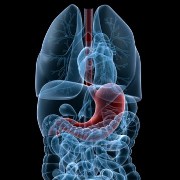 Photo: Getty Images
Photo: Getty Images
Epithelioid hemangioendothelioma (EHE) is a rare type of cancer that occurs in the liver, lungs, bones, and other soft tissue sites. Dr. Juliet A. Emamaullee and colleagues at the University of Alberta, Canada, provided a report on six patients assessed for liver transplantation at their center. The liver is the most common site of EHE.
Liver transplantation is an effective treatment for many patients with EHE. Emamaullee cited data from the European Liver Transplant Registry showing a 70 percent survival rate at five years.
Drug treatments that have been tried include interferon alpha, thalidomide, doxorubicin, mitomycin, 5-fluorouracil, and vincristine. Emamaullee commented, “these agents are generally of limited benefit in EHE.”
EHE is rare enough to make clinical studies challenging. Thus, “there is currently no consensus regarding the management of EHE,” Emamaullee noted.
Her research group performed a study of liver tissues taken from the six patients either during biopsy or liver transplant surgery. They found expression of vascular endothelial growth factor (VEGF) in all samples.
“These data suggest that anti-VEGF therapies should be explored in patients with this disease as a means of reducing tumor volume, as a means of treating unresectable masses, or as an adjuvant during liver transplantation,” Emamaullee concluded.
Bevacizumab (brand name Avastin) is an anti-VEGF therapy that has already been tried on one patient with EHE of the lungs, with positive results. The National Cancer Institute's web site reports that bevacizumab is already approved for some cancers of the breast, colon, lung, brain, and kidney.
Dr. Filipe Salech and colleagues at the University of Chile Clinical Hospital, Santiago, Chile, reported that thalidomide was effective in treating a patient with metastatic EHE of the liver. They chose thalidomide therapy based on the assumption that this drug is similar to bevacizumab in targeting VEGF.
Liver transplantation was ruled out because the cancer had already metastasized. At the time of writing, the patient was doing well nine years after diagnosis.
Salech concluded, “Based on our limited experience, we suggest that, considering its cost and safety profile, thalidomide is a reasonable option of treatment in patients with metastatic HEH [hepatic epithelioid hemangioendothelioma] compared with other anti-angiogenic drugs such as bevacizumab.”
The U.S. National Library of Medicine's PubMed web site provides detailed information about thalidomide.
References:
1. Emamaullee JA et al, “Vascular endothelial growth factor expression in hepatic epithelioid hemangioendothelioma: implications for treatment and surgical management”, Liver Transplantation 2010; 16: 191.
http://www.ncbi.nlm.nih.gov/pubmed/20104492
2. National Cancer Institute. Bevacizumab. Web. Sept. 21, 2011.
http://www.cancer.gov/cancertopics/druginfo/bevacizumab
3. Salech F et al, “Thalidomide for the treatment of metastatic hepatic epithelioid hemangioendothelioma: a case report with a long term follow-up”, Annals of Hepatology 2011; 10(1): 99. http://www.ncbi.nlm.nih.gov/pubmed/21301019
4. PubMed Health. Thalidomide. Web. Sept. 21, 2011.
http://www.ncbi.nlm.nih.gov/pubmedhealth/PMH0001053/
Linda Fugate is a scientist and writer in Austin, Texas. She has a Ph.D. in Physics and an M.S. in Macromolecular Science and Engineering. Her background includes academic and industrial research in materials science. She currently writes song lyrics and health articles.
Reviewed September 26, 2011
by Michele Blacksberg RN
Edited by Jody Smith





Add a CommentComments
There are no comments yet. Be the first one and get the conversation started!